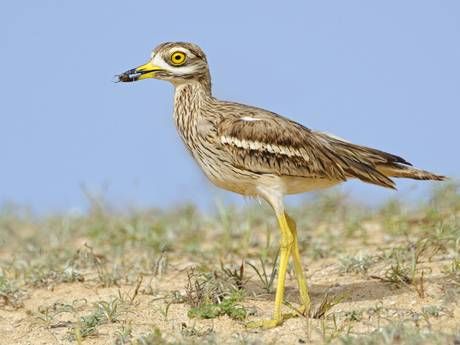It looks like you're using an Ad Blocker.
Please white-list or disable AboveTopSecret.com in your ad-blocking tool.
Thank you.
Some features of ATS will be disabled while you continue to use an ad-blocker.
5
share:
Remains of 8 malnourished stone curlews recently back from Africa and Spain found in Norfolk, Suffolk and Wiltshire

So urce

The stone curlew is one of the UK’s most threatened birds and has recently returned from their wintering grounds in Africa and Spain Rare birds have fallen victim to Britain’s prolonged cold weather with the bodies of several breeds found dead across the country.
The remains of eight malnourished stone curlews – one of the UK’s most threatened birds, recently returned from their wintering grounds in Africa and Spain – were discovered in fields in Norfolk, Suffolk and Wiltshire in the past few days, the RSPB has reported.
The malnourished creatures, which weighed around 300g each compared to a healthy weight of 450g, are believed to have died after struggling to find enough food to survive following their annual migration to the UK.
A number of puffins and other seabirds including razorbills and guillemots were found dead off the coast of Scotland and North East England two weeks ago as a result of continuous freezing conditions and stormy seas making it hard to find food.
There have also been reports of short-eared owls and barn owls found dead after cold weather hindered their ability to hunt.
The late onset of spring has meant a lack of activity usual for this time of year. An influx of migrant birds should be returning to British shores to breed and build nests, but conservationists have noted very little activity. There has been a much lower number of sightings of chiffchaffs, willow warblers and blackcaps than is usual for this time of year, which is worrying given last year’s poor breeding season.
A number of birds have been confused by lower than normal temperatures. Winter migrants like waxwings, fieldfares and redwings are still present in large numbers across the countryside, showing little sign of preparing to head north. Starling murmurations – traditionally a winter evening spectacle – were recorded as late as the Easter weekend in areas including Swindon and Aberystwyth Pier.
RSPB conservation director Martin Harper said: “I can’t remember a spring like this – nature has really been tested by a prolonged period of very cold weather.
“We should be hearing the sound of chiffchaffs calling from the trees – a classic sign that spring is here – but that isn’t the case. Some may have stalled on their migration route, while for others the severe lack of insect food available means they are conserving what little energy they have. “The discovery of eight stone curlews is a stark reminder of how fragile this species is. This amounts to around one per cent of the total UK population of these birds but the total number of deaths is likely to be higher. Many of these birds are only here because of the dedication of farmers who have been creating safe habitats for them in key areas.”
So urce
edit on Thu Apr 11 2013 by DontTreadOnMe because: Starting a New Thread?...Look Here
FirstAboveTopSecret.com takes pride in making every post count. Please do not create minimal posts to start your new thread.If you feel inclined
to make the board aware of news, current events, or important information from other sitesplease post one or two paragraphs, a link to
the entire story, AND your opinion, twist or take on the news item, as a means to inspire discussion or collaborative research on your
subject.
I was sat watching the local Kingfishers at my usual spot a couple of weeks back and we suddenly had an influx of Willow Warblers. Maybe a bit early
for late March, but I did feel sorry for the little blighters, flitting around in snow showers and across the frozen water looking for insects, which
is their main food source.
Hopefully many of them will have survived the last couple of weeks of freezing temperatures. Also had the first Sand Martins, House Martins and Swallows arriving too so good job the weather is at last turning a bit warmer!
Thankfully, many of the other native songbirds have done ok through the prolonged bad spell as myself and many others have been feeding them regularly, and numbers don't seem to be down on other years.
Hopefully many of them will have survived the last couple of weeks of freezing temperatures. Also had the first Sand Martins, House Martins and Swallows arriving too so good job the weather is at last turning a bit warmer!
Thankfully, many of the other native songbirds have done ok through the prolonged bad spell as myself and many others have been feeding them regularly, and numbers don't seem to be down on other years.
new topics
-
leftwing wymen shaving their head in protest
US Political Madness: 27 minutes ago -
Racist Text Messages Mass Distributed
Social Issues and Civil Unrest: 36 minutes ago -
No, the election results aren't reminiscent of 1930s Germany. But this is.
US Political Madness: 2 hours ago -
Agree or Disagree
2024 Elections: 3 hours ago -
Leaving the US due to severe TDS?
US Political Madness: 4 hours ago
5
